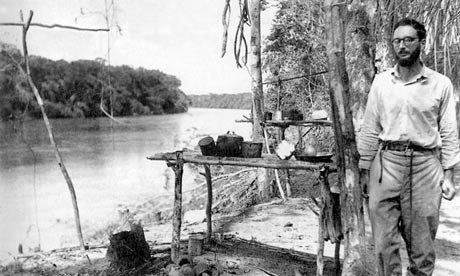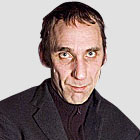
The French anthropologist Claude
Levi-Strauss in Amazonia in the 1930s. Photograph: Apic/Getty
In Barry
Lopez's haunting, poetic book about the hyperborean realms, Arctic Dreams,
there's a magnificent story about an Inuit family who are washed out to the seas
on a calved iceberg. Nothing is heard of them for about 30 years, until one day
they rejoin the rest of their tribal group. The reason for their prolonged
absence is this: it has taken them this long, on the deserted island where they
fetched up, to hunt the seals, narwhals, whales and assorted other fauna,
required to provide the skins, the baleen stretchers, the bone needles and the
sinewy thread with which to construct a seagoing boat – as soon as it was done
they headed home.
There's something about this tale that represents, for me, the quintessence
of what I imagine to be the relationship between traditional hunter-gatherer
peoples and their world. The Inuit family are simultaneously at the mercy of
their environment, and its masters; their capacity to instinctively utilise
every available resource is seamlessly united with high levels of forward
planning, so that in a situation that would cost anyone not so attuned their
lives, they instead go – literally as well as metaphorically – with the
flow.
I probably reread Lopez's
book about every couple of years. Arctic Dreams is a more or less
perfect example of a tendency in my reading towards what can only be described
as "comfort savagery". Lying abed, in the heart of a great, pulsing,
auto-cannibalising conurbation, the supply chain of which girdles the earth like
the monstrous tail of some effluent-belching comet, I find descriptions of how I
myself might have lived before the great grainy surplus of the agricultural
revolution curiously heartening. After all, what does any kind of reading
provide for us if not the opportunity to exercise imaginative sympathy? Others
may prefer to will themselves into James Bond's dinner jacket and Aston Martin
DB4, but I'd rather slip into a !Kung hunter's penis
sheath and heft his hunting spear.
Full article

No comments:
Post a Comment